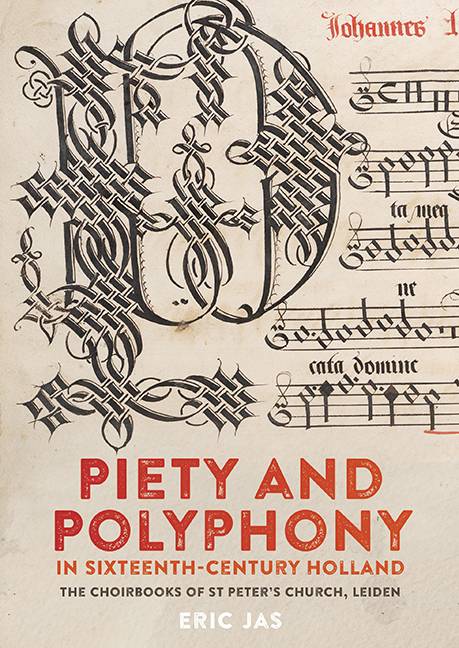Book contents
- Frontmatter
- Contents
- List of Illustrations
- Preface and Acknowledgements
- List of Abbreviations
- Introduction
- 1 The Zeven-Getijdencolleges
- 2 The Seven Hours in St Peter's Church at Leiden
- 3 The Choirbooks of St Peter's Church
- 4 The Repertoire of the Choirbooks
- Epilogue
- Appendix 1 Archival Documents
- Appendix 2 Descriptions and Inventories of the Choirbooks
- Appendix 3 Watermarks
- Alphabetical List of Compositions
- Alphabetical List of Composers
- Concordant Manuscripts and Printed Editions
- Bibliography
- Index
- Studies in Medieval and Renaissance Music
1 - The Zeven-Getijdencolleges
Published online by Cambridge University Press: 17 October 2019
- Frontmatter
- Contents
- List of Illustrations
- Preface and Acknowledgements
- List of Abbreviations
- Introduction
- 1 The Zeven-Getijdencolleges
- 2 The Seven Hours in St Peter's Church at Leiden
- 3 The Choirbooks of St Peter's Church
- 4 The Repertoire of the Choirbooks
- Epilogue
- Appendix 1 Archival Documents
- Appendix 2 Descriptions and Inventories of the Choirbooks
- Appendix 3 Watermarks
- Alphabetical List of Compositions
- Alphabetical List of Composers
- Concordant Manuscripts and Printed Editions
- Bibliography
- Index
- Studies in Medieval and Renaissance Music
Summary
“PURGATORY is above hell and is a corporal fire that supernaturally, by consent of God, burns, tortures and purges the soul.” With these frightening words the Dutch chaplain and theologist Dirc van Delft opens his chapter on purgatory in his Tafel vanden kersten ghelove (“Table of the Christian Faith”). It was certainly not a pleasant prospect: the doctrine of the Church taught that the soul of the deceased could not be admitted to the kingdom of heaven unless that soul had spent some time in purgatory, for the eternal and divine light was so heavenly that only those who were innocent and pure were allowed to behold it. According to Dirc van Delft, such purity was seldom achieved in a lifetime and therefore there had to be some form of purification other than the penance in our lives. One of the questions Dirc answers in the course of his argument is whether the souls that burn in purgatory can somehow be helped. Of the five forms of benefactions that he describes, the first is “prayers by priests, as in masses and memorial services, ordained for release from purgatory”. This option was used on a large scale in the late Middle Ages. Praying for deceased members of the community became one of the most important – and lucrative – tasks of secular clergy.
Well-to-do citizens, guilds and brotherhoods placed large sums of money at the disposal of priests who, in exchange, mentioned the beneficiaries in their prayers or private masses. The most prosperous community members founded their own altars or offered private endowments. Usually, an altar was endowed with interests – from either property or a sum of money – which formed the income for the attending priest. The priest's assignment consisted of celebrating annual, weekly or daily masses and praying for the souls of the benefactor and his or her family. As services such as these were generally held for the souls of the deceased, and not pro populo, they were celebrated on a so called zielaltaar (“soul altar”). Founding or endowing such altars came very much into vogue in the late Middle Ages.
- Type
- Chapter
- Information
- Piety and Polyphony in Sixteenth-Century HollandThe Choirbooks of St Peter's Church, Leiden, pp. 4 - 43Publisher: Boydell & BrewerPrint publication year: 2018



